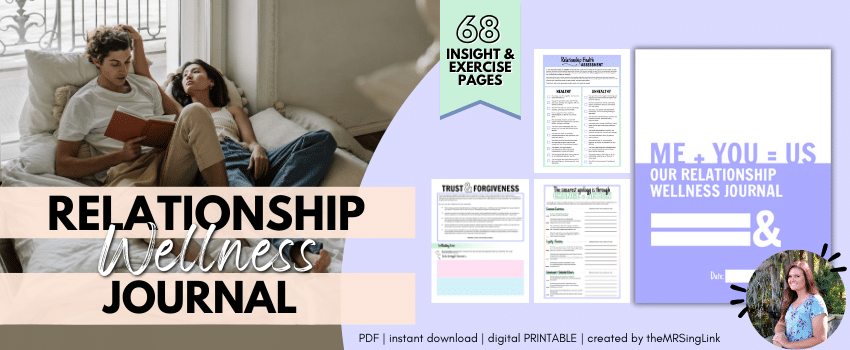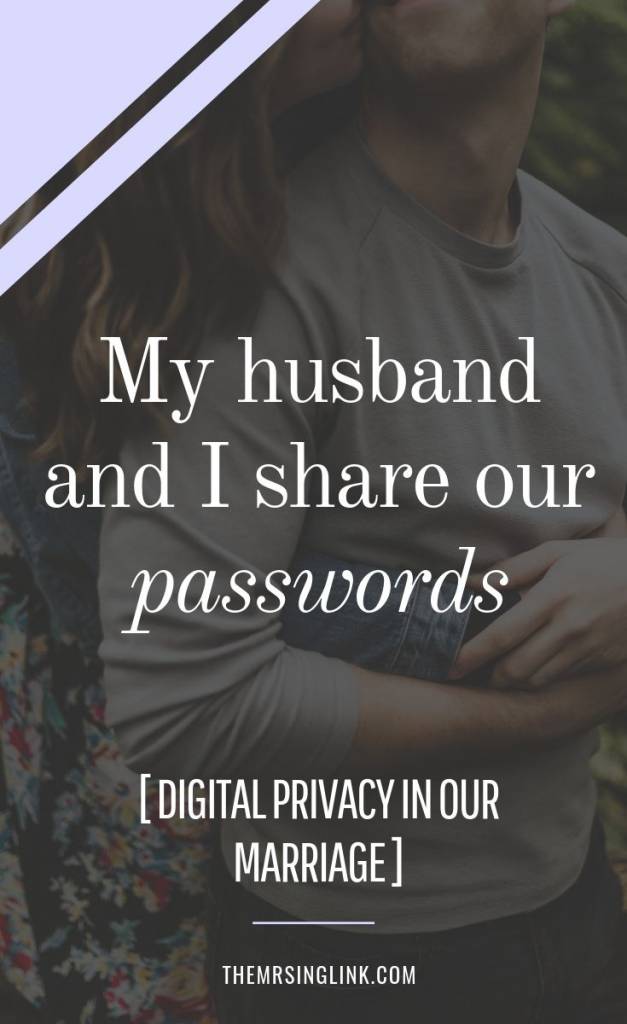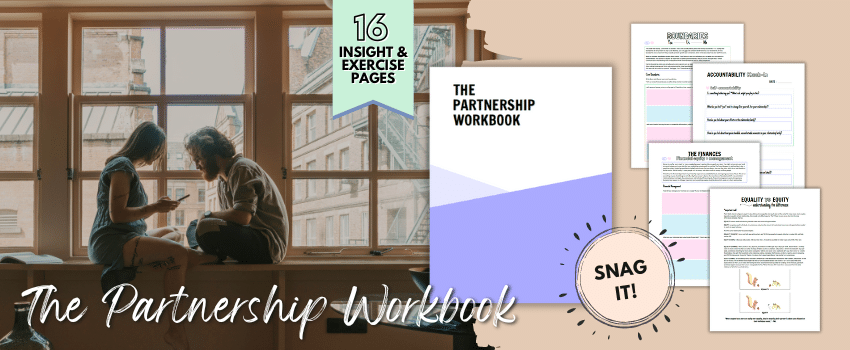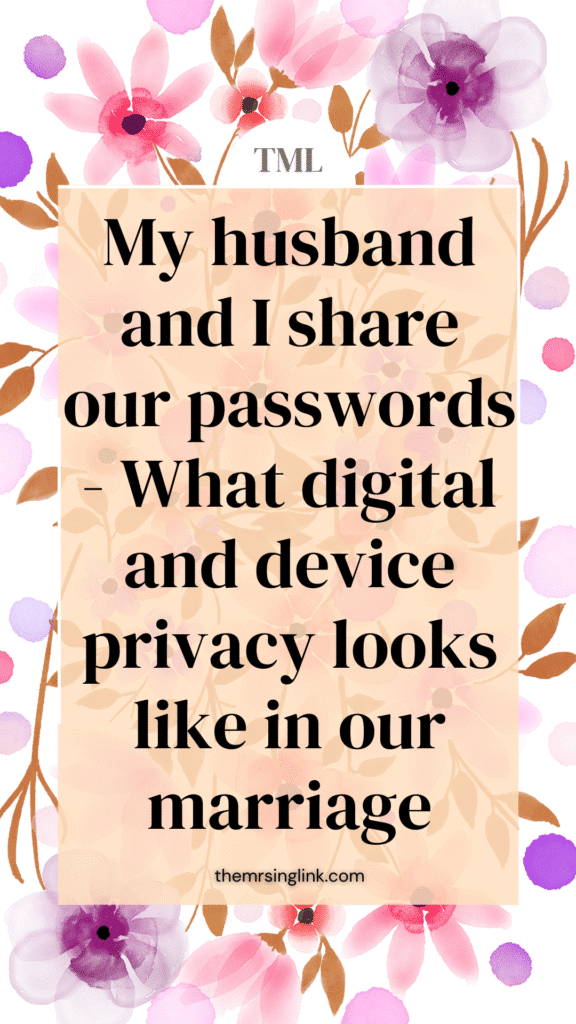Are digital boundaries surrounding our socials and devices important in marriage?
My husband and I are open with our passwords and have no secrets. Our devices are also not considered “off limits” with respect for boundaries.
PSA: There’s a way to be transparent about your devices, digital privacy and boundaries in marriage while also maintaining respect. If you’re in a serious, committed relationship (marriage) then nothing is secretive or on lockdown from your partner.
They can see your private parts (physically speaking), but not proprietary parts (figuratively speaking).
There’s an awful lot of this “My property, my space, my information – you can’t touch this!” mentality, and frankly, it screams, “YOU ARE BANNED FROM THIS SPACE – I NEED ACCESS TO SOMETHING YOU NEVER WILL.”
There’s a difference between withholding or denying your partner access and demanding or feeling entitled to your partner’s “privacy” – a sticky difference, nonetheless.
The main points of this post..
Our world revolves around technology, online social spaces and the constant use of devices like our phones, laptops, Apple watch, tablets, etc. In marriage, this even includes online bank accounts, life insurance policies, and credit card statements.
Our possessions, knowledge and digital entities have become idolized – a lifeline or part of our identities that we have normalized withholding or deeming “off-limits” from others. Meaning, the very person you’re committed to, “for life”, who DESERVES full transparency. The thing I think most tend to misunderstand is that transparency doesn’t necessarily mean entitled access or zero separation, it simply means there’s no real need for something to be completely off limits with no exceptions.
Therefore, I apologize in advance because this topic gets me HOT.
When writing this post, I specifically wanted to focus on digital and device privacy in committed relationships, particularly marriage. When I say committed, I don’t mean someone you’ve been in a relationship with for 6 months. And when I say privacy, I’m not talking about whether or not you and your partner keep the bathroom door closed to do your “business”.
I also want to establish that I do not condone prying, checking or snooping [through my husband’s *privacy*, and vice versa]. At the same time, I will point out how overly rigid boundaries pertaining to our digital and informative world can also be abused.

I’m always a bit taken back when I see the backlash regarding something that, frankly, should be a non-issue in marriage. Sure, what works for some couples won’t for others. But this battle between lack of trust exists on both ends of the spectrum.
The partner who expects full access and is denied that access (say, to their partner’s phone) will believe their partner cannot be trusted. The partner who expects full respect of privacy with zero access and is denied that respect will also believe their partner cannot be trusted.
Point blank: it’s a respect issue on both sides, not necessarily a trust issue.
My husband and I happen to fall under the category that many would still consider controlling, distrusting, and unethical. The difference that most won’t and refuse to see is that transparency is a privilege, and a privilege to be respected. It’s not like my husband and I have no privacy – in fact, it’s honored even more as a result.
The biggest pitfall is that many couples aren’t on the same page and won’t see eye to eye when it comes to understanding privacy versus secrecy. In relationships, privacy is not the same as secrecy. Privacy is the individual separation between you and others. It is also the amenity of ourselves, which does not have any effect on others.
[Ahem], like closing the bathroom door while you pee – wanting this privacy doesn’t hurt your partner in any way.
Secrecy is the deliberate act of defensively closing off others from knowing what you are doing as well as hiding or withholding information – information that is generally sensitive and deceptive.
Like when you’re texting your ex and you go into overdrive – protecting and hiding your phone from your partner, proactively deleting those texts, and changing their name on your phone.
But what about in the case of wanting to keep the passcode on your phone secret or *private*, including from your spouse? Where does that fall exactly – privacy, or secrecy?
Now before I start unraveling my thoughts and perception, know that there are boundaries and exceptions for just about everything. Though I do find it weird to marry someone and not be able to – ‘scuse me, *want to* – share things like your social security (in the name of keeping certain things *private*). Nonetheless, it’s up to you to evaluate the depths of your relationship, period.
That being said, none of my previous long-term relationships had access to my privacy, and digital privacy – not like my husband does. You might say he earned that privilege. But I also see it differently: in my eyes, when the trust is mutual and validated, full transparency naturally follows suit.
What transparency and trust with our devices looks like in marriage
This means all cards are out on the table. My husband’s given me the phone passcode and his passwords to just about everything (not like I can remember them all, really), it’s what I do with and how I treat knowing that information. It’s about respect and knowing that transparency can also be revoked if it is not respected.
This is where our behavior, the abuse of transparency as well as privacy and secrecy, have consequences.
Bottom line is, in my marriage there are no need for secrets, or withholding information unnecessarily from one another.
Sure, realistically, my husband doesn’t know EVERYTHING (and neither do I), because we’re not nose-deep 24/7 in each other’s business. And yet, there’s no digging, begging, or relinquishing of control or ownership. We simply believe it’s in our best interest to be able to have that level of openness and integrity in our marriage, and here’s why.

We both understand, firsthand, the delicacy of trust
I get asked this question fairly often, “Yeah, but how do you KNOW he doesn’t have a secret account he’s just not telling you about?“
The truth is I don’t – I simply trust that he doesn’t, and he hasn’t given me a reason otherwise. We both came from broken-trust past relationships, which I believe is why we value the importance and significance of transparency like we do.
If there’s nothing to hide, you simply won’t need to mute or deny access to it. Therefore, my husband and I know how delicate trust is, and that it was always something not worth compromising. Trust only takes seconds to break, and a lifetime to rebuild.
Couples have a hard time understanding that the definition of risk versus reward is the fine line in trust most are willing to cross first. This includes the spouse who safeguards everything – phone, socials, email, accounts, you name it. That behavior is no longer about ensuring privacy it’s about protecting secrecy, which also withers away at trust.
So, in my marriage, we find greater benefit in sharing – or simply not keeping things forbidden with a lock and key – the vulnerable parts of ourselves as a way to reinforce trust. Yet people might think we exchange phones every night to sweep before going to bed, and that’s far from what happens.
I won’t even bother going into AuToNoMy or personal information for as long as your internet service provider, browser, primary care doctor, bank teller, retail companies, and SOCIAL MEDIA have more access to you and your “privacy” than your partner may ever have.
So ask yourself if there is anything worth risking trust by keeping your partner from having access.

The need to withhold information is no longer privacy
Now let’s not get our panties in a knot just yet – I’m in no way saying you MUST inform your spouse anytime you just blew up the toilet. Please, let’s just get that out of the way as far as what I’m talking about.
You know full and well to never give out your bank account or social security number to every Tom, Dick, and Harry you meet or end up with. This includes new relationships! The point is that you marry someone you, hopefully, trust with any and all information. I can’t believe I’m even saying that, but I’m also well aware there are certainly cases where things like credit card access and use is abused, even in marriage.
I was engaged before making the initiative to merge that realm of information. And nobody prior to my husband ever had information regarding my personal identity, nor were they freely given access to my digital privacy. Then, when I got married, I just didn’t feel I needed to maintain that level of separation, or hidden measures. I also just didn’t WANT to, nor did I feel I needed to – big, key differences at play there.
I’m not telling you to be gung-ho and create a shared Facebook account with your spouse (though some do, and that works for them). Even for my perspective, I think it’s a bit uncanny. But outwardly going out of your way to prevent your partner from ever gaining the ability (even by chance) to access your social media account is a stretch in the wrong direction.
More or less, it’s whatever intent, gut-feeling or thoughts are inside that determine the reasoning for behavior. So this is for those who turn their phones away to prevent their spouse from being able to read your texts or who simply deny their partner from using their phone, even just to take a picture, what’s *really* going on there?
It’s not even a joking matter when certain restrictions become outwardly authoritative much less imply underlying suspiciousness. You really can’t blame the partner for questioning trust when there is such a strong desire or need to withhold information (passcodes) and property (devices).
That level of behavior is no longer upholding privacy, it’s become secrecy.
[Related Read: Are opposite sex friendships a threat in marriage?]
Honestly, the need for restrictive access and control is arrogant
And what it’s really saying is: “There are parts of my life, and myself, that are off-limits. And only I am in control of what I want and allow you to see.”
I’ll say it again – I think the need for restrictive access, and the demand for respect of that restricted access, when not permitted, is simply arrogant.
Many will say that they don’t need a reason to keep certain things private or off limits. That what they consider “privacy” is merely a boundary, and that their partner should respect this boundary. Remember, a boundary is not to be a wall in order to shut and keep someone out.
This doesn’t take into account when a spouse has taken advantage or abused privacy, especially transparent access. For example, if you cheated on your spouse, is it considered abuse if they then demand and voluntarily access the ins and outs of your phone, texts and socials (unbeknownst to you or not) at their disposal?
Still, IMO, there comes a point where if I’m still uneasy about entrusting my husband with my privacy, is that really in line with the progression of trust at all? I mean, that would be like if my husband punished me for something I have yet to actually commit – i.e., he blatantly hides typing in his passcode on his when I have given him zero reason to.
When you have a partner that respects, trusts and honors you – meaning, someone who hasn’t intentionally or maliciously violated your trust, or privacy – there simply won’t be room for barriers of restriction and control. And when you truly love, respect, and trust your partner, nothing will be off-limits – there would be no limitations, conditions or restrictions.
[Related Read: 5 Ways social media can destroy relationships]
![Digital Privacy In My Marriage [We Have No Secrets!] | My husband and I lay all cards out on the table (passwords, phones, and all) | Trust is one of the critical pillars of every relationship, but we forget that privacy is not the same as secrecy - secrecy causes doubt, which can be detrimental to trust. Bottom line is, we don't believe in restrictive access of our privacy, as long as transparency and respect are mutually present | #trust #marriageproblems #relationshipadvice | theMRSingLink](https://themrsinglink.com/wp-content/uploads/2019/09/Digital-Privacy-In-My-Marriage-We-Have-No-Secrets-quote-2-1024x1024.jpg)
Transparency and respect go hand in hand
This is not as confusing as it sounds.
While this is true, that every couple will have their own unique way of regaining, rebuilding, or reinforcing trust, there’s still an immense struggle in understanding and applying the bold heading of this point.
But one thing should always remain the same: Marriage isn’t about ownership or gaining this sense of entitlement over one another. Marriage is not about control it’s about covenant – it’s about responsibility of duty and promise.
My husband and I may be completely open – with our phones, social media and other sensitive information alike – yet that doesn’t mean we are obtrusively violating sensitive information, one another’s personal spaces, or personal possessions (devices). We also don’t condone one another to abuse the power of access to our individual privacy. Unfortunately, this does happen, which can be detrimental to trust and respect.
I’d think it should be common sense, that when privacy isn’t respected (or is violated) transparency weakens, disappears or is less likely to result. Valid.
I’d think it should be common sense, that when transparency isn’t displayed (whereas instead there’s obscurity) respect dwindles, disappears or is less likely to result. Also valid.
Both of these can weaken the foundation of trust over time. The two must go hand in hand, but we’re usually too focused on the logistics of which comes first rather than implementing them together.
So just because my husband and I are open as far as access to one another’s digital privacy., that doesn’t mean we have full rights to take advantage of that transparency.
Being transparent (honest, open) becomes more difficult when trust is an issue. Respect (honor, regard) also becomes difficult when there is a lack of trust. Both these things become increasingly difficult yet are imperative when trust is broken.
That being said, it’s a significant goal that we practice both.
[Related Read: Your relationship needs social media boundaries now more than ever]
There are way more important things than gatekeeping
TBH I could have shortened this article by simply saying my husband and I just don’t GAF about our worldly stuff. Our identities, value, purpose and esteem are not tied to things like our social media, devices or digital, online world.
Marriage is hard work, though worth it, so why purposely create a thorny barrier that shouldn’t be there in the first place by placing unnecessary value and autonomous dominion over the things that shouldn’t matter. There are way more important things to focus on and worry about in this life, and in marriage, than gatekeeping your stuff. From your *spouse*, mind you.
So if you find yourself in the midst of a heat flash because you left your computer open (with the tab of your facebook account in view) or your phone on the counter, and you anxiously race home before your partner has potential access, there are far bigger issues than simply upholding your privacy.
You can’t convince me that anything good comes from a relationship where individuals must be confined to a chest wrapped in chain, bolted shut with a lock and key at all times.
It’s 2025 – it’s only going to get worse from here on out
I might as well bring out the big guns because if you’re one who sways to uphold your digital privacy in your relationship then guess what? The government and the internet already have more beef on you than your spouse.
Sad, but true. In fact, you allow a hacker the better chance of getting into your Facebook account or your sensitive bank information, who can do far more damage, yet many are more triggered by what their significant other is and isn’t allowed to see, read, hear, know and have access to.
And that’s saying something.
When people are asked what the most important thing in their lives is, the majority say family and connection. Yet experiencing authentic connection requires vulnerability over safeguarding. That means prioritizing openness and honesty over control and limitations.
As technology advances, upholding our privacy is only going to be more uncertain and risky in the world, yet we willingly continue to add onto that risk each day. So if you think upholding your privacy is the biggest concern in your relationship, think again because it may actually be trust.
